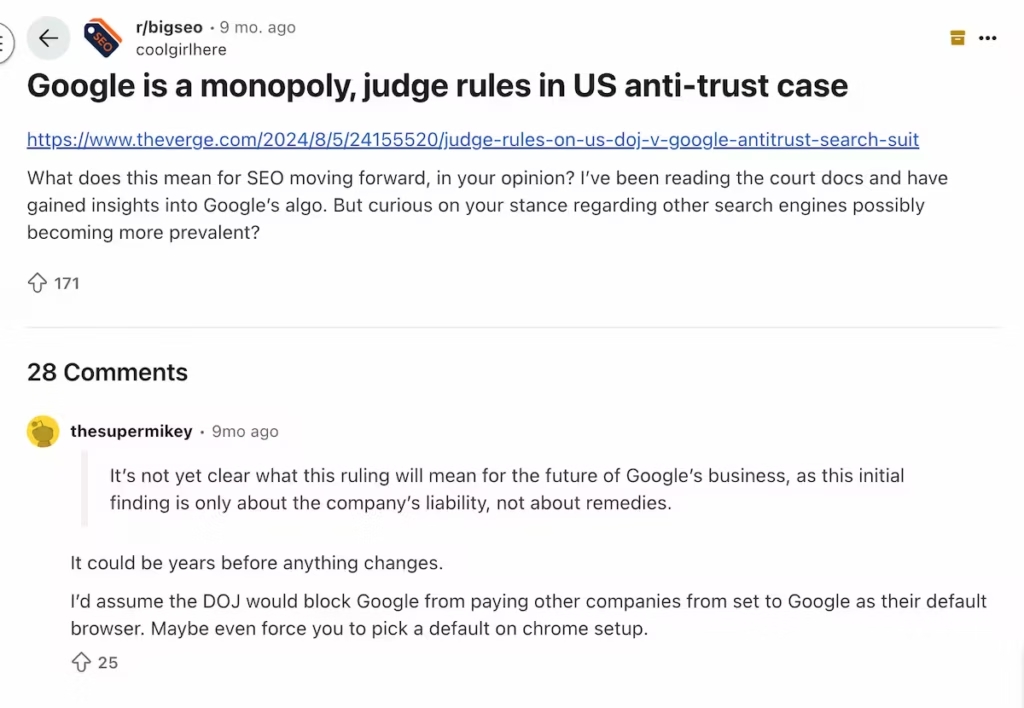Most people think this Google lawsuit is just about ads. Here’s what it means for anyone relying on SEO in 2025….
Remember when we were taught that robber barons were the “bad guys”?
That monopolies were something governments were supposed to check?
That was before Big Tech.
Maybe I’m biased, but it’s one of the few things I remember clear-as-day from U.S. history class:
Monopolies aren’t supposed to win.
Regulation is supposed to protect the rest of us.
And yet, here we are.
In April 2025, the U.S. Department of Justice won its second major antitrust case against Google.
The court ruled that Google’s dominance over digital ads and search distribution was an abuse of power, plain and simple.
“For 17 years, Google has systematically abused its monopolies in search and search advertising to cement its dominance.”
United States Department of Justice, April 2025 press release
Most headlines are focusing on Google Ads and revenue.
But that’s not what I do here.
I’m here to talk about what no one else is: what this means for SEO, visibility, and your website.
Because if you rely on organic search to reach your community? This story matters.
Here’s what you need to know: SEO is resilient.
The defaults may change. The search box might look different. But the fundamentals? They still work, and will continue to.
Quick summary
- April 26, 2025: The DOJ won its second antitrust suit against Google.
- The court found that Google abused its control over advertising tech and search distribution deals (e.g., on phones, browsers).
- These rulings could reshape how search results are shown, what defaults appear on devices, and how AI-powered search (Like Google Gemini) rolls out next.
Disclaimer: This blog post reflects my own professional analysis and opinion, based on publicly available information at the time of writing.

This 1889 cartoon by Joseph Keppler, “Bosses of the Senate”, showed how monopolists loomed over government.
Today, we might swap the steel barons for Big Tech CEOs. The hats got sleeker, the stakes got digital, but the question remains: Who really sets the rules of the web?
What is the Google DOJ antitrust trial, really?
In April 2025, a U.S. federal court ruled that Google illegally maintained its dominance in two critical areas of the internet:
- Search distribution (how it became your default search engine everywhere)
- Digital advertising tech (how it controls the tools that run most online ads)
This was the U.S. Department of Justice’s second major antitrust win against Google in less than two years. The court’s message was clear: Google rigged the search game.
What the lawsuit argued
At its core, the DOJ argued that Google:
- Locked out competition by paying billions to stay the default search engine on phones, browsers, and smart devices (think Apple’s Safari, Android, and Mozilla Firefox)
- Controlled the ad pipeline from start to finish, managing both the buying and selling sides of ad auctions, and favoring its own tools along the way
- Harmed publishers and consumers by stifling innovation and inflating costs across the web
The lawsuit addressed how Google used their size and money to stay the default, even when better or more ethical options existed.
How Google built its monopoly
Google didn’t become the internet’s default by accident, or purely by merit, according to the DOJ. Its dominance in both search and advertising is the result of years of behind-the-scenes deals and systemic control over key parts of the web’s infrastructure.
Let’s break down how it happened.
Default search engine deals
Google pays over $20 billion annually to companies like:
- Apple – to be the default search engine on Safari
- Samsung – to be front-and-center on Android phones
- Mozilla – to control search inside Firefox
If you’ve ever wondered why every browser defaults to Google? Now you know. These deals suppress competition. That’s a closed-door deal that suppresses visibility for competitors, before anyone even starts typing.
Controlling the “ad stack”
The ad stack refers to the full chain of tools and platforms that make digital ads run. Think of it as everything between a brand wanting to show an ad, and a user actually seeing it. Google owns both ends of this chain:
- Buy-side tools like Google Ads, used by marketers to purchase ad space
- Sell-side tools like Google Ad Manager, used by websites to sell that space
This setup lets Google act as the auctioneer, the broker, and the platform, all at once. According to the DOJ, this vertical integration gave Google the power to:
- Prioritize its own products and placements
- Obscure how ad decisions are made
- Inflate prices for advertisers while cutting into publisher revenue
In short: Google made the ad economy more expensive, less transparent, and harder for anyone else to compete.
Why this matters for everyone
Google doesn’t technically own the internet, but it’s spent years designing a system where it acts like it does. It controls how content is discovered, which businesses get surfaced, and what users see first. If your growth depends on search visibility, you’re navigating a hierarchy that Google built to benefit itself.
That’s the core of this lawsuit. It wants to limit the ability of a single company to dictate who gets found, clicked, and trusted online. And for anyone doing SEO? That’s your entire strategy ecosystem being shaped by a closed loop of incentives.
Google’s decisions deeply affect the digital reach of small businesses, creators, and communities. That’s why this matters, even if you never touch an ad account.

How Google’s power shapes SEO (right now)
Most SEO advice, including mine, is about making Google happy. Whether it’s page speed, schema, alt text, or keywords, we’re constantly tuning our content to align with what one algorithm values.
That system isn’t neutral. Google’s ranking decisions reflect its business goals: prioritizing ads, promoting its own products, and now, steering traffic toward AI-generated answers. The more Google expands its ecosystem, the more SEO turns into a maze with moving walls.
Even when you’re doing everything right, you’re still operating within a framework designed to serve Google first.
That doesn’t mean SEO is dead, but it does mean it’s time to talk seriously about platform power, and what strategy looks like beyond the Googleverse.
The hidden cost of visibility
If you’re a small business trying to show up online, you’re optimizing for an algorithm owned and operated by one company. Google dictates what’s visible, what’s clickable, and increasingly, what counts as “relevant.” Your Google Business Profile might play a role, but even that operates inside a walled garden, subject to rules you don’t control.
Organic results are shrinking as Google Ads expand, and with AI-powered search like Gemini and the Search Generative Experience (SGE), the terrain is shifting again. What appears in search, and how it’s framed, is no longer just about keywords. It’s about what the AI chooses to summarize, quote, or surface. And Google wants to shape that future too.
“A landmark antitrust lawsuit about the past has turned into a fight about the future.” – The New York Times, May 1, 2025, “Why the A.I. Race Could Be Upended by a Judge’s Decision on Google”
We’re now asking the question: who gets to set the defaults, and gatekeep what users see?
As SEO shifts into the AI era, small businesses must ask: Whose ecosystem are you building inside?
The need for alternatives
The good news? This lawsuit may finally crack the door open.
If the remedy phase succeeds, alternative search engines like DuckDuckGo, Brave Search, and even decentralized search engine models like Kagi could become more viable competitors. These platforms emphasize privacy, transparency, and user-first design, the very qualities Google’s critics say it’s lost.
Right now, optimizing for Google is often treated as the only path to visibility. But if search distribution diversifies, “SEO” might start to mean optimizing for multiple ecosystems, not just one dominant player.
Want to future-proof your visibility? Start exploring those alternatives now. Not because Google is going away, but because for the first time in years, you might have real options.

How this lawsuit could shift the SEO landscape
This isn’t going to be an overnight revolution.
Big lawsuits like this move slowly. The remedy phase alone will take months, maybe years. But the direction of change? That’s starting now.
If the court’s ruling sticks, and regulators follow through, here’s what could actually shift:
- More competition in search
- Pressure for algorithm transparency
- A world beyond “Google or nothing”
Let’s get into it.
More competition in search
Regulators want to break up Google’s grip on how default search engines are installed on phones and browsers. That means:
- Your next Android device might not come pre-loaded with Google Search.
- Firefox, Safari, and other browsers may stop taking millions in default payments from Google.
- Search alternatives like DuckDuckGo, Brave, or even newer decentralized platforms could actually get a shot.
More competition doesn’t mean Google goes away. But it does mean we might get a more diverse, open internet again, with more places to get found.
Pressure for algorithm transparency
One of the biggest criticisms during the case? Google’s algorithm updates lack transparency, and often benefit its own properties. If antitrust pressure sticks, we might see:
- Disclosures about how search rankings are determined
- Audits of whether Google favors its own services (e.g., YouTube, Flights)
- Fairer treatment for third-party websites, especially those without ad budgets
As someone who leads SEO audits, this would be huge. Right now, clients often ask:
“Why did my traffic drop?”
“Why isn’t this page ranking yet?”
And the truth? Google doesn’t disclose everything. My job is to guide strategy based on patterns, data, and experience… not complete clarity. More transparency wouldn’t just help SEO professionals, it would level the playing field for small businesses.
A world beyond “Google or nothing”
Right now, SEO basically = Google optimization.
But in a world where:
- Gemini doesn’t dominate AI search by default,
- Alternative search engines get real visibility,
- And consumers care more about privacy and ownership than convenience…
SEO might start to mean something bigger.
More platforms. More entry points. More freedom to build visibility without being boxed into Google’s model.
Don’t expect instant change
Yes, this is exciting.
Yes, it matters.
But no, your Google rankings aren’t going to change tomorrow just because the DOJ won.
This is a long-term story. And if you’re building your digital presence to last? That’s a good thing.

What you should actually do about it
The DOJ ruled against Google. So… Now what?
First, don’t panic, but don’t ignore it either. Your rankings aren’t going to disappear overnight. But this ruling is a signal: change is coming. And if you want to stay visible long-term, it’s time to build resilience into your digital presence.
Build SEO for humans, Not just Google
The businesses that will thrive through this shift are already doing a few key things:
- Writing content their audience actually wants to read
- Structuring their sites clearly and accessibly
- Prioritizing trust, readability, and page speed, not cheap tricks or hacks
If that’s not your current setup, no judgment. That’s what a strong SEO audit is for: figuring out what needs fixing and what’s already working, based on data, not guesswork.
Diversify where (and how) you show up
Google is massive, but it’s not the whole internet. Now more than ever, you need to build visibility across multiple channels.
That includes your website (yes, still), your Google Business Profile, your email list, and any platforms you actually own, like a Substack, podcast, or paid community. And don’t sleep on alternative search engines either. DuckDuckGo, Bing, and Brave Search may finally get more traction in a post-Google-default world.
Durable SEO isn’t built on a single platform. It’s built on clarity, consistency, and digital autonomy.
For more ways to de-center Big Tech in your marketing, check out my LGBTQ+ small business resource guide.
Watch out for platform lock-in
It’s easy to rely entirely on Google tools because they’re everywhere. But this trial is a reminder that those tools come with trade-offs. Over-relying on Chrome-specific formats, Google Docs for public content, or hosting files in SEO-unfriendly platforms can leave you vulnerable when policies shift.
Own your strategy wherever possible. Know your platforms. And make sure you can pivot when the time comes.
Keep investing in what actually works
The fundamentals haven’t changed, and they won’t.
- Clear, fast websites
- Deep, thoughtful content
- Local SEO that meets people where they are
- Strategies aligned with your values
This lawsuit might change how we show up. But it doesn’t change why showing up matters.

Frequently asked questions: What Google’s monopoly case means for SEO in 2025
The U.S. Department of Justice ruled that Google used its dominance in search and digital ads to stifle competition. This includes exclusive deals (e.g., with Apple, Samsung, Mozilla) to be the default search engine and controlling the digital ad stack.
The legal spotlight is mostly on Google Ads, but the ripple effect will impact SEO too. Search defaults, indexing behaviors, and platform gatekeeping may shift, changing how organic content gets visibility.
It’s unlikely in the short term. But regulation could force more transparency about how rankings work or reduce the bias toward paid placements.
A lot. The DOJ argued that Google’s monopoly in search gives it an unfair head start in dominating AI-powered search via Gemini. If courts intervene, this could open up competition in how people find information online.
It’s a reminder that your SEO strategy shouldn’t rely solely on Google. Diversify where and how you show up, through platforms like DuckDuckGo, GMB, email lists, and even new AI tools.
That’s the hope. If courts block exclusive default deals, search engines like DuckDuckGo, Brave, and Kagi may see more visibility on browsers and devices.
Not yet. Remedies haven’t been finalized. But the DOJ is pushing for aggressive options, including forcing Google to divest Chrome or share more search data.
Short term: business as usual. Long term: a more competitive landscape could reduce platform lock-in. That means better chances to rank across engines, but also more to learn.
Yes. Google still owns the lion’s share of search traffic. But your SEO should also prepare for platform shifts, focusing on quality content, clear site structure, and universal best practices.
These tools are gaining traction. If the court forces Google to open up, competitors like OpenAI and Perplexity could deliver search experiences that challenge Google’s dominance.
Absolutely. SEO is about visibility, not just one platform. Good practices, fast websites, clear messaging, useful content, will matter no matter who’s at the top.
It’s similar in legal theory, both involve companies using default software placement (like browsers or search engines) to suppress competition. The Microsoft case in the early 2000s led to restrictions on bundling Internet Explorer with Windows. But here’s the catch: Internet Explorer didn’t vanish. It was renamed (Edge), and in 2024, it still can’t be fully uninstalled.
So while the court might curb Google’s default dominance with Search and Gemini, that doesn’t mean total dismantling. It may change how defaults are offered, not whether Google tools exist on your device.
Unlikely. Google tools like Google Business Profile (GMB) may stick around, but they could lose their default visibility edge. That’s a good reason to treat GMB as just one piece of your visibility plan.
Most agree change will be slow. But they’re watching closely. Some expect that default search options will be forced open, while others expect Google will fight to maintain the status quo for as long as possible.
Years. Remedies are still being debated in court. But strategy-wise, it’s smart to be future-proof now.
Yes. Whether it’s Google tools or social platforms, don’t put all your digital eggs in one basket. Own your audience through email, your website, and multi-channel content.
Yes, with nuance. SEO remains one of the few digital tools not fully pay-to-play. It rewards depth, consistency, and audience alignment. And unlike social media? It compounds over time.

Future-proof your SEO strategy with a digital marketing agency that gets it
This lawsuit is about who gets seen, who stays invisible, and who controls the future of the web.
If you care about ethical marketing, long-term visibility, and connecting with your audience in ways that don’t rely on algorithms or ad budgets, this matters.
Google’s loss might mark the beginning of a shift. But your strategy doesn’t have to wait.
You deserve a digital presence that outlasts platform chaos.
Whether you’re auditing your current site, looking for alternatives to Google-centric tools, or just want to understand where visibility is headed next, I’m here.
👉 Contact me to talk SEO, sustainability, and search that actually serves you.







